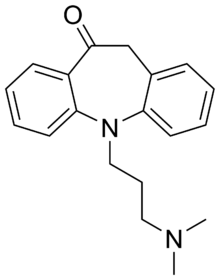Ketipramine
Ketipramine (G-35,259), also known as ketimipramine or ketoimipramine, is a tricyclic antidepressant (TCA) that was tested in clinical trials for the treatment of depression in the 1960s but was never marketed.[1][2][3] It differs from imipramine in terms of chemical structure only by the addition of a ketone group, to the azepine ring, and is approximately equivalent in effectiveness as an antidepressant in comparison.[4]
 | |
| Clinical data | |
|---|---|
| Routes of administration | Oral |
| ATC code |
|
| Identifiers | |
| |
| CAS Number | |
| PubChem CID | |
| ChemSpider | |
| UNII | |
| CompTox Dashboard (EPA) | |
| Chemical and physical data | |
| Formula | C19H22N2O |
| Molar mass | 294.398 g·mol−1 |
| 3D model (JSmol) | |
| |
See also
References
- Dictionary of organic compounds. London: Chapman & Hall. 1996. ISBN 0-412-54090-8.
- Simeon J, Fuchs M, Nikolovski O, Bucci L (1970). "Ketipramine in the therapy of depression in outpatients". Psychosomatics. 11 (4): 342–6. doi:10.1016/S0033-3182(70)71634-4. PMID 5459338. Archived from the original on 2011-07-27.
- Park S, Glick B, Floyd A, Gershon S (May 1971). "Ketipramine fumarate as compared to imipramine in depressed outpatients". Current Therapeutic Research, Clinical and Experimental. 13 (5): 322–5. PMID 4998396.
- Author Unknown (1971). Ann Reports Medicinal Chem V6 (v. 6). Boston: Academic Press. ISBN 0-12-040506-7.
| 5-HT1AR agonists | |
|---|---|
| GABAAR PAMs |
|
| Gabapentinoids (α2δ VDCC blockers) | |
| Antidepressants |
|
| Sympatholytics (Antiadrenergics) |
|
| Others | |
| |
| α1 |
|
|---|---|
| α2 |
|
| β |
|
| See also | |
| |||||||||||||||||||||||||
| H1 |
|
|---|---|
| H2 |
|
| H3 |
|
| H4 |
|
See also: Receptor/signaling modulators • Monoamine metabolism modulators • Monoamine reuptake inhibitors | |
| 5-HT1 |
| ||||||||||||||||||||||||||||||||||||||
|---|---|---|---|---|---|---|---|---|---|---|---|---|---|---|---|---|---|---|---|---|---|---|---|---|---|---|---|---|---|---|---|---|---|---|---|---|---|---|---|
| 5-HT2 |
| ||||||||||||||||||||||||||||||||||||||
| 5-HT3–7 |
| ||||||||||||||||||||||||||||||||||||||
| |||||||||||||||||||||||||||||||||||||||
| Classes | |
|---|---|
| Antidepressants (TCAs and TeCAs) |
|
| Antihistamines |
|
| Antipsychotics |
|
| Anticonvulsants | |
| Others |
|
This article is issued from Wikipedia. The text is licensed under Creative Commons - Attribution - Sharealike. Additional terms may apply for the media files.